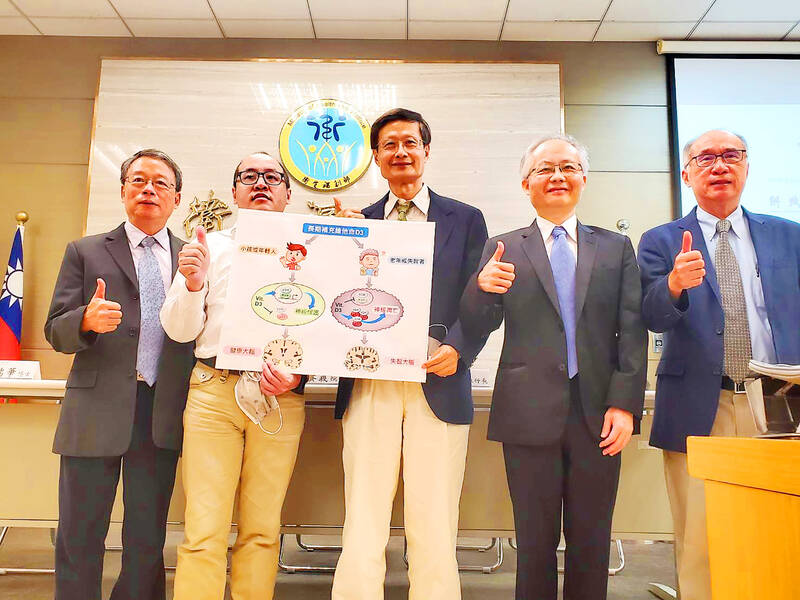Elderly people who take vitamin D supplements long-term and regularly have 1.8 times the risk of developing Alzheimer’s disease or other forms of dementia compared with those who do not, National Health Research Institutes (NHRI) scientists said yesterday.
The Ministry of Health and Welfare said that 7.78 percent of Taiwanese aged 65 or older have some form of dementia.
Vitamin D plays a role in maintaining cognitive function, and many studies have found that vitamin D deficiency correlates with an increased risk of dementia, leading many people to take the vitamin to prevent the disease, NHRI Institute of Molecular and Genomic Medicine researcher Juang Jyh-lyh (莊志立) said.

Photo: Lin Hui-chin, Taipei Times.
However, a study led by Juang and NHRI National Center for Geriatrics and Welfare Research scientist Hsu Chih-cheng (許志成), using the National Health Insurance database, found that elderly people who took a 0.25mg vitamin D3 supplement 146 days or more each year had 1.8 times the risk of developing dementia compared with those who did not take the supplement.
Additionally, people with dementia who took vitamin D3 had a 2.17 times greater risk of death, he said.
Juang said his research team conducted additional studies that experimented on mice, finding that mice with Alzheimer’s disease that were fed a vitamin D-sufficient diet showed significantly lower levels of serum vitamin D.
When vitamin D was decreased in the mice, the number of the vitamin’s binding receptors in the brain increased in the same plaques considered a trigger for Alzheimer’s disease, he said.
Overall, the study seems to show that vitamin D deficiency might be a result rather than a cause of Alzheimer’s disease, and that vitamin D supplements could hasten brain degeneration in people who have the condition.
However, Juang added that the findings do not suggest that vitamin D supplements have no benefit, as they could be valuable in other areas of health.
Juang said that he would remind people not to over-use vitamin D supplements.
Those who might be vulnerable to dementia should re-evaluate the need for the vitamin and consult a physician before taking the supplement, he said.

Taiwan is to commence mass production of the Tien Kung (天弓, “Sky Bow”) III, IV and V missiles by the second quarter of this year if the legislature approves the government’s NT$1.25 trillion (US$39.78 billion) special defense budget, an official said yesterday. Commenting on condition of anonymity, a defense official with knowledge of the matter said that the advanced systems are expected to provide crucial capabilities against ballistic and cruise missiles for the proposed “T-Dome,” an advanced, multi-layered air defense network. The Tien Kung III is an air defense missile with a maximum interception altitude of 35km. The Tien Kung IV and V

The disruption of 941 flights in and out of Taiwan due to China’s large-scale military exercises was no accident, but rather the result of a “quasi-blockade” used to simulate creating the air and sea routes needed for an amphibious landing, a military expert said. The disruptions occurred on Tuesday and lasted about 10 hours as China conducted live-fire drills in the Taiwan Strait. The Civil Aviation Administration (CAA) said the exercises affected 857 international flights and 84 domestic flights, affecting more than 100,000 travelers. Su Tzu-yun (蘇紫雲), a research fellow at the government-sponsored Institute for National Defense and Security Research, said the air

A strong continental cold air mass is to bring pollutants to Taiwan from tomorrow, the Ministry of Environment said today, as it issued an “orange” air quality alert for most of the country. All of Taiwan except for Hualien and Taitung counties is to be under an “orange” air quality alert tomorrow, indicating air quality that is unhealthy for sensitive groups. In China, areas from Shandong to Shanghai have been enveloped in haze since Saturday, the ministry said in a news release. Yesterday, hourly concentrations of PM2.5 in these areas ranged from 65 to 160 micrograms per cubic meter (mg/m³), and pollutants were

Taiwan’s armed forces have established response protocols for a wide range of sudden contingencies, including the “Wan Chun Plan” to protect the head of state, the Ministry of Defense (MND) said today. After US President Donald Trump on Saturday launched a series of airstrikes in Venezuela and kidnapped Venezuelan President Nicolas Maduro, concerns have been raised as to whether China would launch a similar “decapitation strike” on Taiwan. The armed forces regularly coordinate with relevant agencies and practice drills to ensure preparedness for a wide range of scenarios, Vice Minister of National Defense Hsu Szu-chien (徐斯儉) told reporters before a